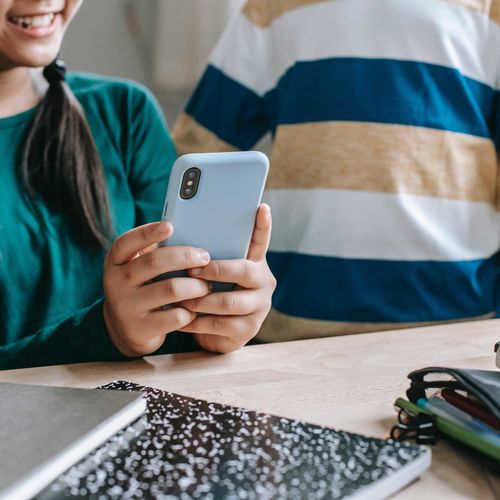Have any questions?
+44 1234 567 890
What is Mobile Sensing?
Written by: Nick Murray

Photo by Katerina Holmes from Pexels
The Rise of the Smart Device
Smartphones and wearable technology have boomed in popularity in recent years. In the United States, 91% of people were estimated to be smartphone users in 2021, compared to only 20% of people in 2009 [1]. The statistics are similar in Canada – the percent of Canadians who own a cell phone grew from 24% in 2009 to 93% in 2020 [2].
While smart devices may have negative health effects (such as social media addiction), these new technologies have their share of benefits too. During the COVID-19 pandemic, video chat apps like Zoom and FaceTime enabled families, friends, colleagues, and more to maintain some semblance of social interaction during lockdowns. Like most technologies, smart devices have their advantages and disadvantages.
What is Mobile Sensing?
In the Predicting Risks and Outcomes of Social InTeractions (PROSIT) Research Lab, one kind of smart-device technology we are especially optimistic about is mobile sensing. Mobile sensors include things like the GPS, light and noise sensors, and screen time trackers built into smartphones. For example, Google makes great use of the GPS on many peoples’ smartphones to create traffic maps in real-time that inform drivers which routes are backed up with traffic or flowing smoothly. We are optimistic about mobile sensing because the sensors can measure mental-health related behaviours, such as how people socialize, exercise, and sleep.
For some intuitive examples: we can estimate how sociable someone is by measuring how much time they spend sending messages via text or using social media. Using a GPS, we can estimate how much exercise someone is getting. And by seeing what time of day people have their phone screens on and off, we can estimate how much they are sleeping. The PROSIT mobile sensing app can anonymously make all these measurements (and more!) through smartphones.
The Benefits of Mobile Sensing
Behaviours like sociability, exercise, and sleep are strongly related to how people feel, including how anxious or depressed they could be. So, it is useful to measure these behaviours. But you may be wondering: why not just ask people how they feel, and how much they are socializing, exercising, sleeping, etc.? We often do ask people these sorts of questions. In many of our studies, the PROSIT app asks participants everyday how anxious they feel, and occasionally asks them about their social activities, exercise, and sleep habits.
Asking people how they feel and behave is incredibly useful for research and clinical practice. This “subjective measurement” technique has inspired every kind of psychotherapy that is practiced today, from psychodynamic therapy to cognitive behavioural therapy. The problem is we cannot ask people questions every minute of the day, so we have to ask them to remember how they felt or behaved in the past. People do not always remember or know how they felt or behaved, even within the past month – sometimes people even forget what they had for breakfast today!
People can only tell you so much because they only know so much about themselves. The biggest advantage of mobile sensing is that it does not rely completely on peoples’ memories; instead, mobile sensors measure behaviours as they happen, in real-time. To make it even better, mobile sensors make measurements passively, without a smartphone user having to do anything on their phone. Mobile sensing gives us a huge amount of data, so we can understand how people behave when they feel certain ways, such as happy, anxious, excited, or depressed.
The Future of Mobile Sensing
Mobile sensing is being used by many companies and researchers to monitor aspects of mental and physical health. We are using the PROSIT app to measure mental health and well-being in youth, including youth with or without mental health disorders (such as anxiety). The app is currently under development not just with the help of our research team and academic collaborators, but also with the help of many youths who graciously offer us their feedback and assistance to improve the design. This research would not be possible without all our youth collaborators! (As a side note, Dr. Matthew Orr, a postdoctoral researcher in the lab, has an exciting article coming soon about PROSIT’s youth collaboration).
Currently, we are using the PROSIT app in a wide variety of projects, including to assess how anxiety affects attention in younger women; to measure differences between youth and adults with anxiety problems; to see how youth without mental health problems use social media, and more. In 2020, Dr. Sandra Meier (the lab’s principal investigator) and Dr. Rita Orji (a close collaborator with the lab) were featured in a CBC News article, talking about how the lab used the PROSIT app to measure peoples’ mental well-being during the COVID-19 pandemic [3].
Our hope is that mobile sensing tools like the PROSIT app will eventually empower youth to understand and manage their mental health. The app has already shown promising results – in 2021, the lab published a paper showing that the PROSIT app successfully monitored anxiety, depression, and attention-deficit hyperactivity disorder (ADHD) symptoms and related-behaviours in 122 youth [4].
With the help of our youth participants and collaborators, our funders, and the support of Dalhousie University, the IWK Health Centre, and the Strongest Families Institute, we look forward to developing the PROSIT app further in 2023 and beyond. If you want to follow us along, feel free to keep checking in with our website or follow us on social media (see links below).
Thank you for reading.
The PROSIT Research Team
Facebook: https://www.facebook.com/prositlab
Instagram (@prosit_lab): https://www.instagram.com/prosit_lab/
Comments